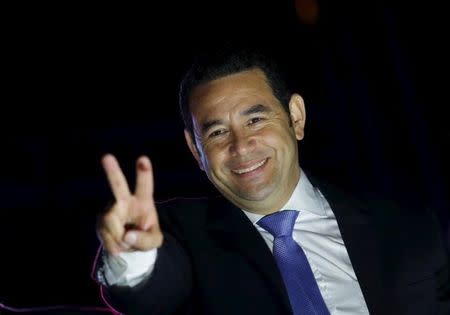Anti-corruption unit's shadow looms over Guatemala's next leader

By Alexandra Alper GUATEMALA CITY (Reuters) - Until a U.N.-backed body began exposing corruption at the heart of Guatemala's government, Jimmy Morales was nowhere in the race to become president. Now the former TV comedian, who scored a landslide victory on Sunday, is poised to take power in the shadow of the same team that helped topple his predecessor. Morales was carried to the presidency on a wave of public anger over political corruption uncovered by the International Commission against Impunity in Guatemala (CICIG). Touting himself as an outsider determined to tackle corruption, he won with 68 percent support, showing how discredited traditional parties are in the impoverished Central American nation. Led by a former Colombian state prosecutor and supported by the United States and the United Nations, the CICIG has turned Guatemalan politics on its head since implicating President Otto Perez in a multi-million dollar customs racket that led to his arrest last month. Set up to deal with paramilitary gangs in 2007, the CICIG has in the last few months gone from being an obscure, forgotten office of the United Nations to a force that ousted Perez and became a crucial factor in Morales' victory. However, corruption runs so deep in Guatemala that Morales' own administration may itself be at risk if the CICIG trains its sights on his allies. "It's his Achilles' heel," said Christians Castillo, a political analyst at National Problems Institute, a think tank at the University of San Carlos. "Those who would be coming into power with him, I think, would be very worried." Asked on Sunday what he would do if the CICIG accused him or his ministers of corruption, Morales said he would let any investigations run their course and that "neither the president nor the vice president would be exempt." Morales' center-right National Convergence Front (FCN) will have just 11 of 158 deputies in Congress, making him reliant on other parties to govern. Perez himself sent Morales a word of warning about the CICIG from his military prison in Guatemala City, where he is awaiting trial. "The institution is above everyone, it isn't accountable to anyone," Perez, a retired general, told Reuters, urging Morales to review the CICIG's remit. "That is not the strengthening of justice that we are after in this country." Perez denies involvement in the customs scheme and accused the U.S. government of forcing him to extend the CICIG's mandate by threatening to cut off U.S. aid to Guatemala if he refused. He said the CICIG has undermined national sovereignty, a view shared by some others in Guatemala's political and military establishment. "The CICIG is an extension of the United States' State Department in Guatemala," said Ricardo Mendez, head of the right-wing Foundation Against Terrorism, a lobby group for retired Guatemalan military officials. Morales has praised the CICIG and already vowed to renew its mandate twice in his four year term, which begins in January. But his FCN also has ties to the military, which played an often brutal role in Guatemala's 1960-1996 civil war. 'IVAN THE TERRIBLE' Illegal paramilitary groups left over from the war brought the CICIG into being, but it was all but "dead" by the time former Colombian prosecutor Ivan Velasquez took the helm in 2013, said Carmen Aida Ibarra, executive director of the Pro-Justice Movement, a group committed to strengthening Guatemala's judicial institutions. Nicknamed "Ivan the Terrible," Velasquez shifted the CICIG's focus to political corruption, having previously exposed links between nearly 200 lawmakers and organized crime in Colombia. In Guatemala, Velasquez used information gleaned from the cell phone of a Chinese businessman caught up in a prior customs fraud to untangle a scheme where importers paid bribes to avoid customs duties. According to the CICIG, the scam led all the way to Perez and his vice president, Roxana Baldetti. Under U.S. pressure, Perez renewed the CICIG's mandate in April, and several graft scandals soon came to light involving senior officials. Within a month, Baldetti was forced to stand down over the customs probe and she was later arrested. Last month, Perez resigned and was taken into custody so he could face fraud and corruption charges leveled against him by the CICIG and Attorney General Thelma Aldana. Morales would have the power to kill off the CICIG but he has pledged to allow it to continue its work. Tens of thousands of Guatemalans took to the streets to pile pressure on Perez over the CICIG findings, and Morales would risk quickly losing support if he moved against the commission. "At first, I wasn't in favor of (the CICIG) out of shame, because it really is an embarrassment to have an international organization come to your country to teach you how to do justice," said Miriam Bourda, a travel agent in Guatemala City. "But we needed it ... Thank God we have it." (Additional reporting by Sofia Menchu and Enrique Pretel; Editing by Dave Graham and Kieran Murray)

